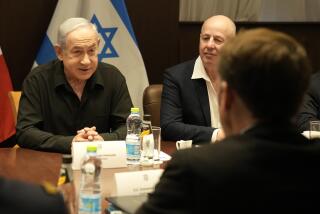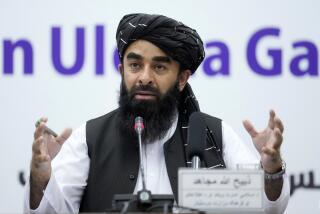He Wonât Step Down Despite Setbacks, Afghan President Says : Politics: Najibullah vows to stay until a U.N. settlement allows elections that include his party. Observers see signs of a âsiege mentalityâ in Kabul.
KABUL, Afghanistan â President Najibullah, one of the worldâs last Soviet-backed totalitarian leaders, says he has no intention of stepping down, despite the fall of the hard-liners in the Kremlin and the KGB who put him in power and the imminent prospect of an end to his arms supplies from Moscow.
In his first interview with the American or Soviet press since last monthâs failed coup in the Soviet Union, the burly Afghan dictator told The Times on Thursday that he intends to stay in office until the United Nations arranges a political settlement that would include national elections in which his ruling party could take part.
Najibullah also said in the interview that he would not leave until Moscow and Washington agree to end simultaneously all arms supplies to the various sides in the 13-year civil war. To his evident surprise, that condition was met in an announcement from Moscow on Friday: Soviet Foreign Minister Boris D. Pankin and Secretary of State James A. Baker III agreed to cut off the weapons pipeline--from Moscow to Najibullahâs regime and from Washington to the anti-regime moujahedeen rebels--by the end of this year.
It was clear that Najibullah and his military commanders had not expected such an agreement so soon. Just a day earlier, the president had insisted several times in the interview that he had received no indication that Soviet military aid would end. Just last week, he noted, the Soviet ambassador in Kabul had pledged in a meeting with top Afghan military leaders that there was no chance of a suspension of arms deliveries.
The full impact of the Moscow announcement was unclear here Friday, Afghanistanâs weekly holy day, but Najibullahâs regime is believed to have stockpiled enough weaponry to last for another two years.
The president made no public statement on the announcement Friday. But in the interview Thursday, he asserted several times that his regime actually would welcome such an agreement.
âThere should be an international guarantee to bring peace in the country through a cease-fire and a guarantee for the stoppage of delivery of weapons to and from all sides--not just from the U.S. and the Soviet Union but from Pakistan, Saudi Arabia and Iran,â he said.
The agreement announced in Moscow did not cover arms aid to the rebels from those other countries. But Najibullahâs regime has been calling for an arms cutoff from outsiders since the Soviet Union withdrew the last of its 110,000 troops in February, 1989.
Najibullah also said for the first time that he would accept a U.N. peacekeeping force to administer any future cease-fire in Afghanistan. But his rejection of resignation talk was seen by local analysts as part of a post-coup âsiege mentality.â Apparently, they say, the regime is determined to cling to power at any cost, to avert anarchy or a takeover by the Islamic fundamentalists who have fought him and his predecessors since 1978.
âIâm still young enough to rule,â the 44-year-old Najibullah declared with a laugh when asked about the toll of his seven years in office, of coup attempts and the loss of allies in the Soviet Union after last monthâs failed coup there.
âWill the Soviet Union or the United States of America take the responsibility for removing this leader or proposing that leader for Afghanistan? No. This is not their right. This is the power of the people,â he said.
Najibullahâs expression of determination to stay comes at a time when most Asian and East European diplomats here have concluded that his regime is at its weakest since 1984, when the Soviet KGB and Soviet military occupying Afghanistan put him in power. He was head of Afghanistanâs secret police, the Khad, at the time.
It also comes as the capital suffers acute shortages of fuel and food, the result of a disruption in supplies from the Soviet Union that most people here fear will bring starvation, and diplomatic isolation now that the staunchest foes of Soviet aid to Afghanistan have taken power in Moscow. Russian Federation President Boris N. Yeltsin, who led resistance to the Soviet coup and emerged as a dominant political figure, spoke out against Soviet military aid to Najibullahâs regime long before Fridayâs agreement.
Addressing that threat, the Afghan leader said Thursday that he remained confident of continuing arms supplies âin the mutual interests of our two nations.â
Najibullah insisted that he is confident that a combination of continued Soviet economic aid and aggressive buying by a newly emerging Afghan private sector will avert starvation this winter among Kabulâs 1.2 million residents.
Najibullah put on a jovial and relaxed demeanor, laughing frequently and smiling throughout the half-hour interview, but he also appeared more nervous than in previous interviews and his answers were more guarded and carefully crafted to mirror his ruling party line.
Since the Soviets withdrew their troops, Najibullah has walked an ever-narrower path of survival between young, progressive members of his ruling Homeland Party, who seek to mimic the perestroika policies of Mikhail S. Gorbachev, and hard-liners left behind to guard Moscowâs interests in the Afghan army and secret police.
Moves to rid the party of its Draconian image, which included a new constitution that promises private enterprise and never mentions the word socialism , helped spark a coup attempt last year by Najibullahâs hard-line former defense minister, Shahnawaz Tanai.
Several diplomats and Afghan analysts said that a cessation of Soviet military aid now almost certainly would trigger another such attempt.
Putting his partyâs positive spin on the turn of the political tide in the Soviet Union, Najibullah said in the interview that he believes the changes will actually accelerate the peace process and end a war that has killed more than a million people and forced 4 million more into exile.
âToday, when the understanding between the United States and Soviet Union is deepening . . . it has provided fertile grounds for the solution of all regional conflicts,â he said. âAnd I believe the conflict in Afghanistan should now be settled soon.â
More to Read
Sign up for Essential California
The most important California stories and recommendations in your inbox every morning.
You may occasionally receive promotional content from the Los Angeles Times.










